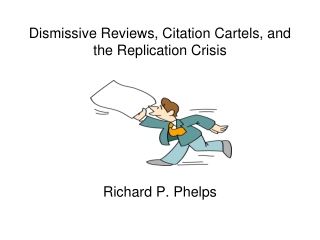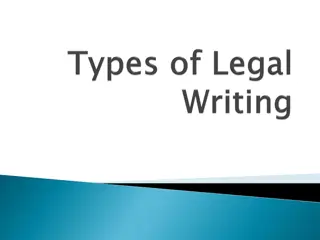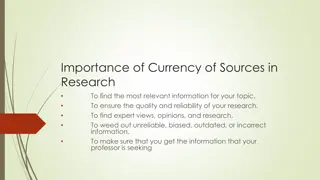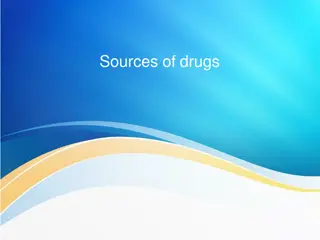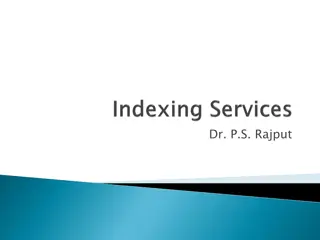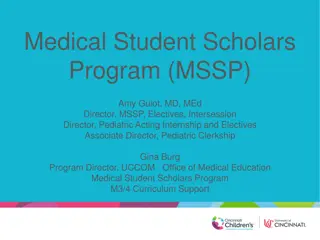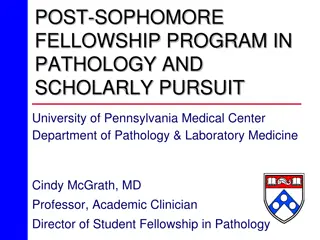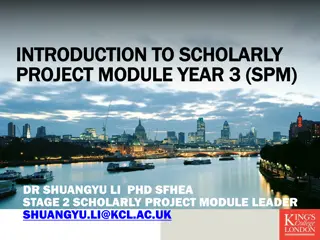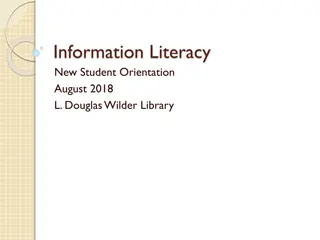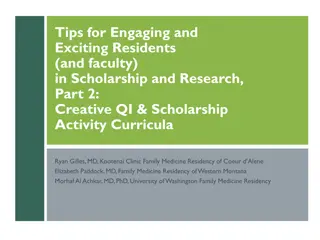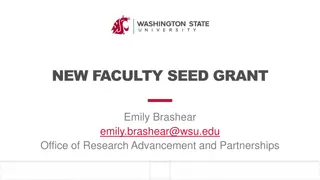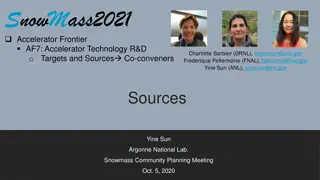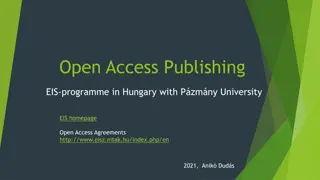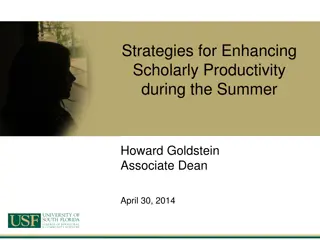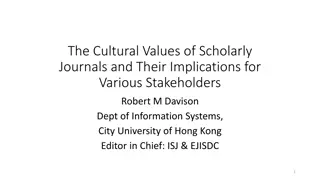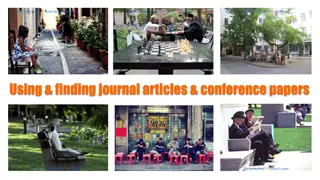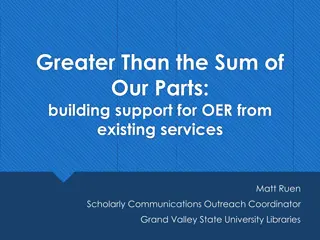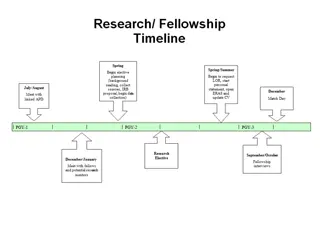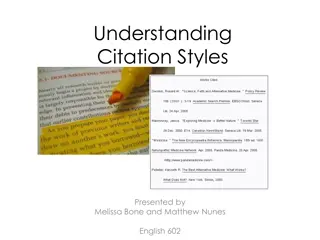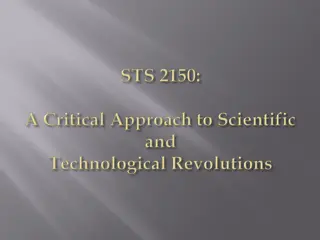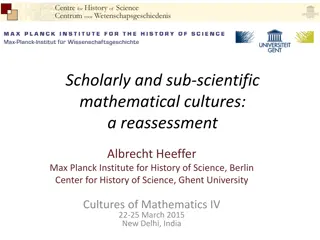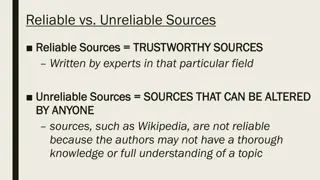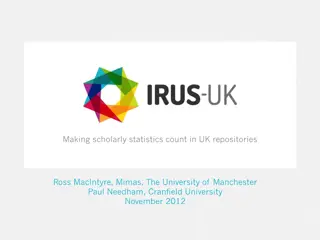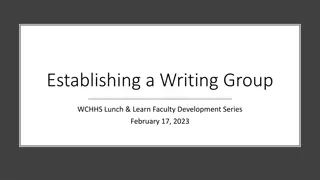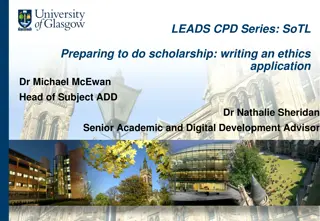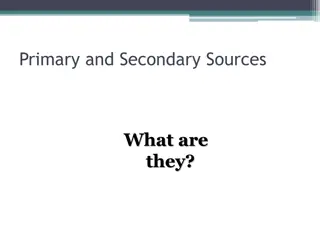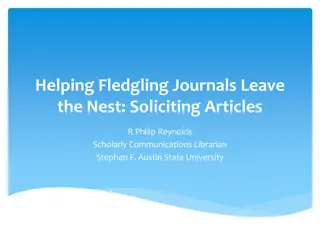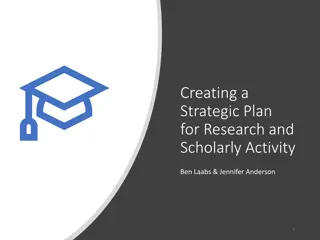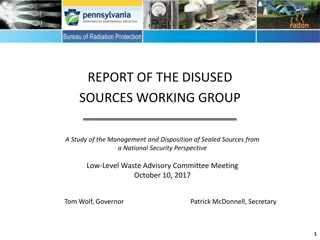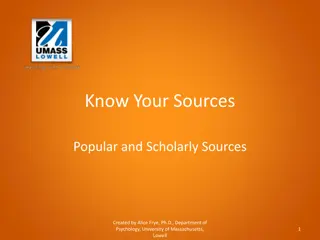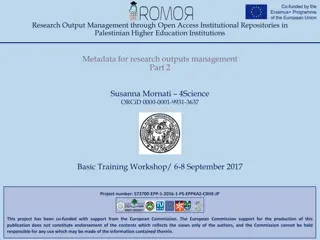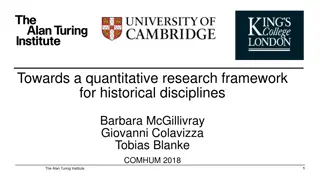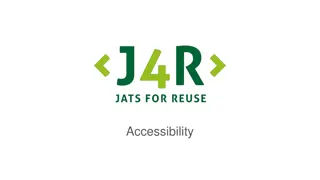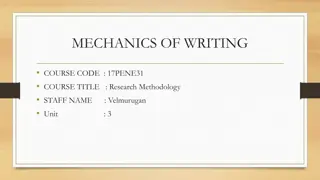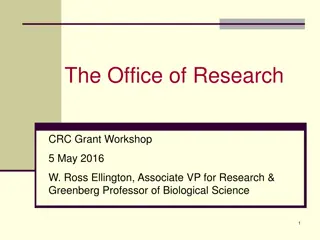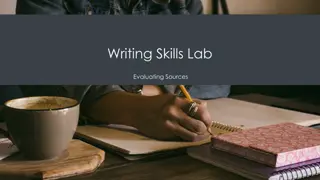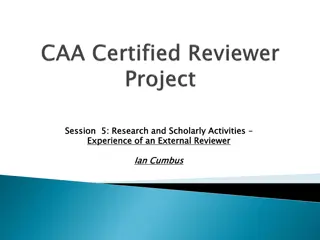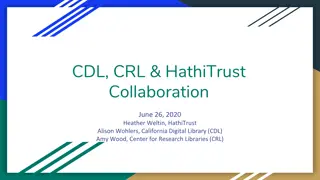Dismissive Reviews, Citation Cartels, and the Replication Crisis
The study delves into the replication crisis in research, citing factors influencing research credibility such as sample size, effect size, and financial interests. It highlights issues like gaming the system, P-hacking, and data sharing reluctance. The growth of Metascience as a response to these c
0 views • 45 slides
The Purpose and Methodology of Scholarly Legal Writing
Scholarly legal writing serves to advance knowledge within specific fields by offering in-depth analysis, historical context, and contributing new insights to legal literature. It distinguishes itself from practice-related writing by focusing on research, surveying existing knowledge, and engaging i
3 views • 22 slides
Importance of Currency of Sources in Research: Enhancing Your Academic Pursuit
Recognizing the significance of currency in sources furthers academic research by ensuring relevance, quality, and credibility. Seminal works hold crucial importance in shaping understandings and methodologies. Sources include primary and secondary texts, data, and scholarly articles, each serving u
0 views • 5 slides
Sources of Drugs and Their Origins
Drugs can be sourced from six major categories: plants, animals, minerals/earth, microbiological sources, semi-synthetic sources, synthetic sources, and recombinant DNA technology. Plant sources, being the oldest, provide various medicinal properties through leaves, flowers, fruits, seeds, roots, ba
0 views • 11 slides
Indian Citation Index (ICI) - Enhancing Access to Indian Scholarly Content
Indian Citation Index (ICI) is a multidisciplinary research platform developed by The Knowledge Foundation. With over 1000 scholarly journals, ICI aims to bridge the gap between content sources and users, providing online access to a wide range of Indian publications in various fields. The database
0 views • 10 slides
Medical Student Scholars Program Overview
The Medical Student Scholars Program (MSSP) offers motivated medical students opportunities for in-depth exploration of various specialties, including clinical experiences, research projects, scholarly work, and leadership development over four years. The program features tracks in cardiovascular me
0 views • 21 slides
Post-Sophomore Fellowship Program in Pathology and Scholarly Pursuit at University of Pennsylvania Medical Center
Student Fellowship Program in Pathology at University of Pennsylvania Medical Center offers a unique work-study experience for students interested in pursuing a career in pathology. The year-long program includes rotations in Anatomic and/or Clinical Pathology, a dedicated research project, and tail
2 views • 4 slides
Scholarly Project Module in MBBS Year 3 Overview
Scholarly Project Module (SPM) in MBBS Year 3 is a pivotal module focusing on developing students into doctors as scholars and scientists. It includes a project-based approach, essential skills development, and assessments like a 3000-word essay. The module runs in the first semester and covers vari
0 views • 11 slides
Insights from Surveys on Peer Review & Peer Feedback in Scholarly Communication
Results from surveys on peer review and peer feedback provide valuable insights into the demographics, general attitudes, and major challenges faced in scholarly communication. The data reveals respondent demographics, overall satisfaction with peer review systems, and prevalent problems in current
0 views • 13 slides
Understanding Information Literacy: A Comprehensive Guide for Students
Information literacy is crucial for academic success. It involves the ability to recognize the need for information, locate relevant sources, evaluate their credibility, and effectively use the information for research and presentations. Primary and secondary sources play a vital role in gathering i
0 views • 19 slides
Enhancing Engagement in Scholarly Activities and Research in Family Medicine Residency Programs
Explore strategies and challenges in promoting scholarly activities and research participation among residents and faculty in family medicine residency programs. Learn about ACGME/RRC requirements, importance of research in primary care, and creative QI and scholarship curricula. Discover insights o
0 views • 25 slides
Washington State University New Faculty Seed Grant Program
Encouraging new junior-level faculty at Washington State University to develop research, scholarly, or creative programs with the potential for sustained professional growth and external support. Eligible applicants include junior-level faculty appointed on or after May 16, 2019. The program offers
0 views • 26 slides
Accelerator Technology R&D Targets and Sources Overview
The SnowMass2021 Accelerator Frontier AF7 focuses on Accelerator Technology R&D, exploring targets and sources such as high brightness electron sources, muon sources, and high intensity ion sources. The community planning meeting discussed various Letter of Interest submissions outlining innovative
0 views • 7 slides
Open Access Publishing and EIS Programme at Pázmány University: Empowering Research and Scholarly Communication
Discover the advantages of Open Access (OA) publishing and how researchers benefit from immediate accessibility, increased discoverability, and global readership. Learn about the EIS Programme at Pázmány University, a member institution dedicated to providing essential electronic resources for hig
0 views • 12 slides
Strategies for Enhancing Scholarly Productivity
Enhance your scholarly productivity with effective strategies like creating a routine time for writing, setting realistic goals, organizing your writing space, and getting started with daily writing habits. Maximize your time wisely and prioritize writing tasks to achieve your summer goals.
5 views • 27 slides
Scholarly Journal Cultural Values and Stakeholder Implications
Scholarly journals like ISJ and EJISDC embody cultural values that shape behaviors and interactions among stakeholders. This keynote delves into the significance of diversity in editorial boards, care for stakeholders, trust, integrity, community, and the types of research published. An emphasis is
0 views • 23 slides
Understanding Different Types of Literature: Journals and Conference Papers
Explore the distinctions between trade and scholarly journals, the value of scholarly articles for higher-order thinking, and the insights provided by conference papers for practicing planners. Learn how to search for journal articles and conference papers effectively in preparation for research in
1 views • 7 slides
Building Support for OER at GVSU: A Collaborative Initiative
Embodying values, seizing opportunities, and encouraging innovation, Grand Valley State University's Libraries, Scholarly Communications, and other support services join forces in the OER Initiative. Motivated by enhancing research, teaching, and technology support, the initiative receives backing f
1 views • 25 slides
Residency Scholarly Endeavors and Requirements at OHSU
Residency at OHSU entails engaging in two scholarly endeavors throughout the program, including first-author responsibilities for various academic presentations and publications. The structured timeline outlines activities from July to July, such as training, mentor meetings, manuscript submissions,
0 views • 12 slides
Importance of Understanding Citation Styles in Academic Writing
Understanding different citation styles is crucial for academic writing across various disciplines. It helps students comprehend the role of citation in different communities, research methodology, and the value of knowledge in diverse fields. Citation practices in the humanities emphasize authority
0 views • 12 slides
Understanding Handlin's Key Concepts and Arguments in Scholarly Articles
This exploration delves into the principal conclusions, key concepts, and arguments presented by Handlin in scholarly articles. It scrutinizes how Handlin interprets the key concepts, distinguishing his perspective from others. The analysis aims to provide a comprehensive understanding of Handlin's
0 views • 32 slides
Reassessing Scholarly and Sub-Scientific Mathematical Cultures
Scholarly and sub-scientific mathematical cultures are reevaluated through the works of Jens Hoyrup, focusing on the organized nature of sub-scientific knowledge. The distinction between theoretical and practical knowledge, applications to mathematical cultures, and misconceptions related to the sup
0 views • 53 slides
Understanding Reliable and Unreliable Sources for Research
Recognize reliable and unreliable sources for research. Reliable sources, such as books and peer-reviewed journals, are authored by experts in the field. Unreliable sources like Wikipedia and blogs can be altered by anyone. Learn how to evaluate the credibility of online sites based on their URLs an
0 views • 10 slides
Enhancing Scholarly Statistics in UK Repositories
The IRUS-UK project aims to standardize and improve the collection and reporting of usage statistics for UK institutional repositories. By enabling sharing of reliable and comparable statistics, IRUS-UK facilitates benchmarking and demonstrates the value of repositories in scholarly dissemination.
0 views • 18 slides
Establishing a Writing Group for Faculty Development in WCHHS Lunch & Learn Series
Engage in a dynamic writing group to foster collaboration, receive feedback, and enhance productivity. Explore the benefits of accountability, safe feedback, and breaking down frustrations while celebrating accomplishments. Dive into logistics, including duration variability, writing retreat options
0 views • 9 slides
Ethics Application: Scholarly Preparation & Considerations in Educational Research
Explore the importance of scholarly preparation for writing an ethics application in educational research, incorporating adequate preparation, ethical considerations in SoTL, BERA guidelines, and ethical considerations such as risk, consent, and confidentiality.
0 views • 14 slides
Understanding Primary and Secondary Sources in Research
Primary sources provide firsthand information from the time period being studied, while secondary sources offer interpretations based on primary sources. Examples of primary sources include autobiographies, speeches, historical documents, published firsthand accounts, and sound recordings. Secondary
0 views • 23 slides
Strategies for Soliciting Articles in Scholarly Publishing
Scholarly publishing entails soliciting articles effectively to nurture fledgling journals. This involves utilizing diverse methods such as sending questionnaires, posting flyers, and leveraging traditional publisher services. Editors play a vital role in initiating the process early and engaging mu
0 views • 16 slides
Strategic Planning for Research and Scholarly Activity
Dive into the world of strategic planning with this comprehensive guide on research and scholarly activity. Explore key elements, examples, decision-making processes, and tools like SWOT analysis and project management software. Learn how to prioritize projects, allocate resources, and align your pl
0 views • 15 slides
Disused Sources Working Group Report on National Security Perspective
The Disused Sources Working Group (DSWG) report focuses on managing and disposing of sealed sources to reduce national security risks. Formed in 2011, DSWG developed recommendations to enhance the management of disused sealed sources. The report categorizes sealed sources based on potential harm and
0 views • 15 slides
Understanding the Importance of Sources in Psychology
Delve into the significance of differentiating between popular and scholarly sources in psychology to enhance research accuracy and reliability. Learn to discern between credible sources and the importance of referencing original sources for accurate information.
0 views • 18 slides
Research Output Management in PS Higher Education: FAIR Metadata Principles
Research output management in higher education focuses on making scholarly output findable, accessible, interoperable, and reusable through the implementation of FAIR metadata principles. The digital ecosystem surrounding scholarly publications faces barriers like fragmented repositories, varied app
0 views • 22 slides
Biography of Imam Malik bin Anas - Scholarly Legacy and Contributions
Explore the life and contributions of Imam Malik bin Anas, a prominent Islamic scholar from Madina, known for his scholarly status, founding a school of Fiqh, and authoring the Muwatta. Discover the factors that contributed to his genius, his upbringing, and the key positions he held in the Second C
0 views • 8 slides
Quantitative Research Framework for Historical Disciplines
Scholarly communities in historical disciplines are combining quantitative and qualitative methods to study phenomena that change over time. The proposed general methodological reflection aims to enhance research in historical linguistics through quantitatively driven models and claims. Quantitative
0 views • 18 slides
Enhancing Scholarly Content Reusability through Accessibility in JATS XML
Explore the importance of accessibility in JATS XML for scholarly content reusability. Understand the significance of meeting accessibility recommendations, implications for different reader groups, and the impact on creating accessible documents in various formats. Delve into key questions guiding
0 views • 27 slides
Essential Components of Scholarly Writing: A Guide to Mechanics
Understanding the mechanics of writing is crucial for scholarly work. This course covers research methodology, spelling consistency, punctuation rules, word division, plurals, foreign words, and more. Learn to apply correct writing components like spelling, punctuation, italics, numbers, and capital
0 views • 21 slides
Office of Research at FSU: Empowering Scholarly Pursuits
The Office of Research at FSU strives to support faculty in securing research funding, protecting intellectual property, and promoting research activities across disciplines. The team, led by dedicated administrators, plays a crucial role in the university's research ecosystem. External funding is e
0 views • 7 slides
Evaluating and Differentiating Sources for Research
Explore the methods to assess the quality and reliability of sources, differentiate between scholarly and non-scholarly sources, evaluate print, online, and multimedia resources, and conduct a CRAAP analysis for print resources. Learn how to navigate the responsibility of accessing information in th
0 views • 13 slides
Research and Scholarly Activities External Reviewer Experience
Explore the experience of an external reviewer in evaluating research and scholarly activities within an educational institution. Key aspects include assessing research strategy, scholarly productivity, and student engagement in research. Examination of policies, strategy development, resource alloc
0 views • 10 slides
Collaboration for Shared Print Collections: Vision, Mission, and Principles
This collaboration between HathiTrust, CDL, and CRL aims to enhance access to shared print collections, promote equity in scholarly resources, and leverage networks for collaborative infrastructure. The vision includes embedding shared print in library collections, enriching the scholarly record, an
0 views • 10 slides
